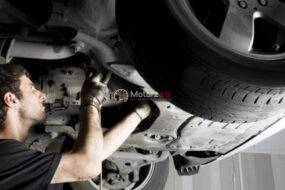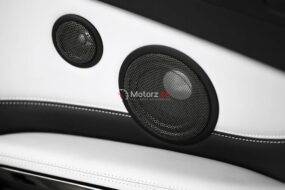Exhaust System Rust Prevent and treat rust issues Your vehicle’s exhaust system plays a crucial role in ensuring optimal performance and reducing harmful emissions. However, one common adversary that can compromise its functionality is rust. Rust not only affects the aesthetics of your exhaust system but can also lead to more serious issues if left unaddressed. In this article, we will explore the causes of exhaust system rust, preventive measures, and effective treatments to keep your vehicle’s exhaust system in top condition.
Moisture and Salt Exposure:
One of the primary causes of Exhaust System Rust is exposure to moisture and salt. In regions where roads are treated with salt during winter to combat ice, vehicles are more susceptible to rust. The salt accelerates the oxidation process, leading to the formation of rust on the exhaust system components. The exhaust system operates at high temperatures, especially during combustion. These extreme temperatures can cause the metal components to expand and contract, creating an environment conducive to rust formation over time.
Acidic Substances:
Exhaust System Rust Certain environmental factors, such as exposure to acidic rain or other corrosive substances, can contribute to the development of rust on the exhaust system. The acidity can expedite the corrosion process, leading to weakened metal structures. Certain environmental factors, such as exposure to acidic rain or other corrosive substances, can contribute to the development of rust on the exhaust system. The acidity can exacerbate the corrosion process, leading to weakened metal structures.
Regular Maintenance:
Consistent and thorough maintenance is the first line of defense against exhaust system rust. Regularly inspect your exhaust system for signs of rust, paying close attention to the joints, hangers, and muffler. Addressing early signs of rust can prevent the issue from escalating. Applying an undercoating or rust inhibitor to the exhaust system can provide a protective layer, reducing the impact of moisture and salt exposure. These coatings act as a barrier, preventing rust from forming on the metal surfaces.
Stainless Steel Components:
Consider upgrading to stainless steel exhaust components. Stainless steel is more resistant to corrosion and rust compared to traditional steel. While it may involve a higher upfront cost, the long-term benefits in terms of durability and rust prevention make it a worthwhile investment.
Proper Driving and Storage Practices:
Avoiding harsh driving conditions and storing your vehicle in a garage can contribute significantly to preventing exhaust system rust. Limiting exposure to extreme weather conditions and environmental factors can extend the life of your exhaust system. Specify what constitutes harsh driving conditions, such as frequent exposure to salt on the roads during winter or driving through areas with high levels of pollutants. Provide examples of alternative routes or driving habits that can minimize exposure to these harsh conditions.
Surface Rust Removal:
If rust is detected at an early stage, surface rust can be removed using a wire brush or sandpaper. Once the affected area is cleaned, applying a rust converter or inhibitor can help prevent further corrosion. For small rusted areas, consider patching with specially designed exhaust repair patches. These patches adhere to the metal surface, providing a temporary fix until more extensive repairs can be undertaken.
Professional Repairs or Replacement:
In cases where rust has significantly compromised the structural integrity of the exhaust system, it’s advisable to seek professional assistance. Professional mechanics can assess the extent of the damage and either repair or replace the affected components. Applying heat-resistant coatings to the exhaust system can help protect against future rust formation. These coatings create a barrier that shields the metal from the harsh conditions it faces during operation.
Conclusion
Exhaust System Rust is a common issue that, if left untreated, can lead to more severe consequences for your vehicle’s performance and safety. By understanding the causes and implementing preventive measures, you can significantly reduce the likelihood of rust formation. Regular maintenance, protective coatings, and timely treatments for existing rust are key to ensuring a long and healthy life for your exhaust system. Remember, a little care today can save you from costly repairs tomorrow.





